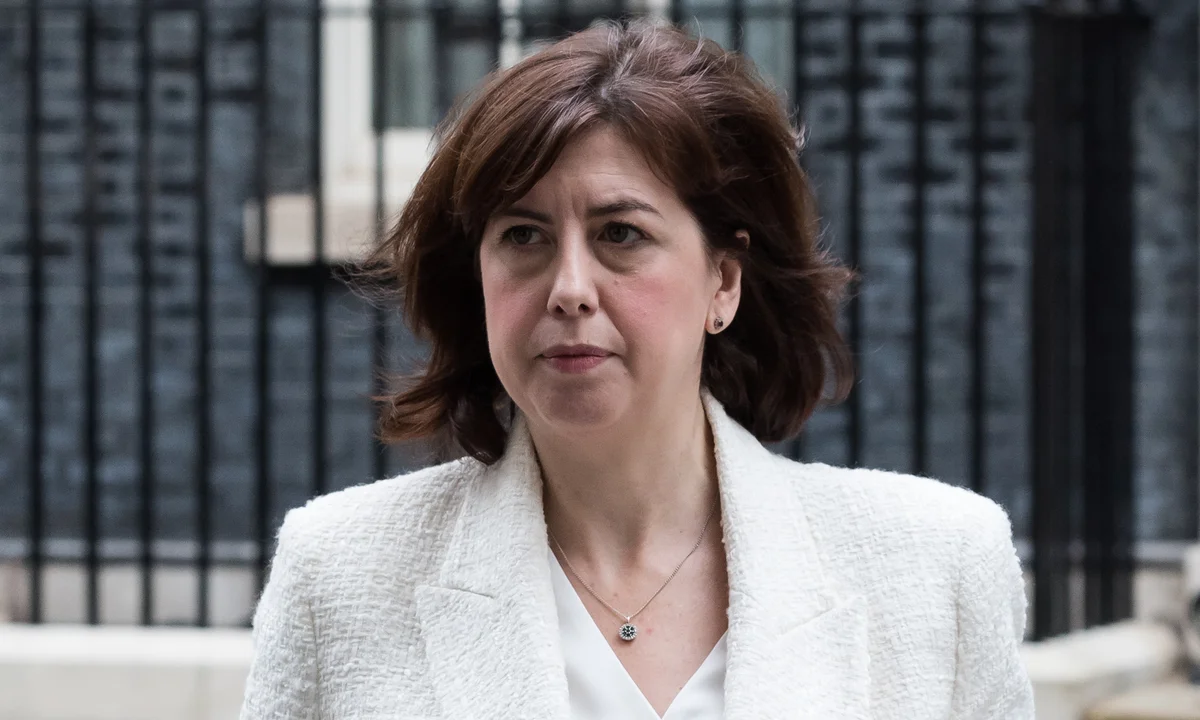Labour MP Lucy Powell’s sneering dismissal of the Pakistani grooming gang scandal as a “dog whistle” on BBC Radio 4’s Any Questions is a grotesque betrayal of tens of thousands of Britain’s most vulnerable girls. Her words, spat out on 2nd May 2025, trivialise the unimaginable horrors—rape, torture, and trafficking—endured by predominantly white working-class victims at the hands of gangs, largely of Pakistani Muslim heritage, across towns like Rochdale, Rotherham, and Telford. Worse still, her flippancy comes as many of these convicted rapists, like Rochdale’s Adil Khan and Qari Abdul Rauf, remain free on Britain’s streets, defying deportation orders years after their heinous crimes. Channel 4’s Groomed: A National Scandal has reignited public fury over this decades-long injustice, exposing how governments, councils, police, and social services buried the truth to avoid “racial tensions.” Yet Powell, a senior Labour figure, chooses to mock rather than mourn, aligning with a leftist elite that prioritises multicultural sensitivities over justice. Her unpunished remark and Labour’s refusal to confront this national disgrace—while perpetrators exploit legal loopholes to stay in the UK—reveal a shameful complicity that enabled the abuse and continues to deny victims closure. This article unmasks Powell’s callousness, the institutional cowardice that fuelled the cover-up, and the ongoing scandal of rapists walking among us, demanding accountability for a nation that has failed its daughters for far too long.
Lucy Powell’s ‘Dog Whistle’ Comment: Minimising a National Tragedy & International Scandal
On 2 May 2025, Labour MP Lucy Powell exposed her party’s moral bankruptcy during a BBC Radio 4 Any Questions debate. As commentator Tim Montgomerie referenced Channel 4’s Groomed: A National Scandal, which laid bare the systemic abuse of tens of thousands of girls by Pakistani grooming gangs, Powell interjected with venomous sarcasm: “Oh, we want to blow that little trumpet now, do we? Yeah, OK, let’s get that dog whistle out.” This callous remark dismisses the rape, mutilation, and trafficking of an estimated 100,000 predominantly white working-class girls across England and Wales as mere political point-scoring. Victims, many as young as 11, were plied with drugs and alcohol, gang-raped, and tortured—some doused with petrol or threatened with guns—yet Powell reduces their suffering to a “dog whistle,” implying the issue is a racist trope rather than a documented atrocity. Her words echo the progressive playbook that brands any discussion of the gangs’ ethnic dimension as “Islamophobic,” a tactic that has long shielded perpetrators and silenced whistleblowers. By framing the scandal as divisive rhetoric, Powell perpetuates the same cultural cowardice that allowed police, councils, and social services to ignore victims for fear of offending community sensibilities. Astonishingly, she has faced no consequences—no censure from Labour leader Keir Starmer, no outrage from the leftist-leaning mainstream media, and no apology to the survivors whose trauma she so casually belittled. This lack of accountability lays bare a chilling truth: Powell’s mindset, steeped in the dogma of multiculturalism-over-justice, mirrors the institutional indifference that left Britain’s girls to suffer for decades, and her unpunished rhetoric risks ensuring that history repeats itself.
The Scale of the Scandal: A Betrayal of Britain’s Girls
The Pakistani grooming gang scandal is not a footnote in Britain’s history—it is a national catastrophe that scarred tens of thousands of lives. From the 1990s to the 2010s, organised gangs, predominantly of Pakistani Muslim heritage, preyed on vulnerable girls in towns like Rochdale, Rotherham, Telford, and beyond, exploiting them with chilling efficiency. In Rochdale, 47 girls were identified as victims, though the true number is likely higher; Rotherham’s 2014 Jay Report estimated 1,400 victims, many as young as 11; Telford’s 2022 inquiry suggested over 1,000 girls were abused. These were not isolated incidents but a coordinated pattern of predation, targeting predominantly white working-class girls, often from care homes or deprived estates, deemed “worthless” by their abusers. The crimes were barbaric: girls were plied with drugs and alcohol, gang-raped, beaten, and trafficked between towns. Court records reveal horrors that defy comprehension—one Rochdale victim was impregnated at 13; in Oxford, a girl endured anal gang rape after brutal “preparation”; in Telford, victims were threatened with petrol and guns. The perpetrators, largely Pakistani Muslim men, operated with impunity, their actions enabled by cultural attitudes—described in some reports as rooted in misogyny and tribalism—that justified targeting non-Muslim girls as disposable. This was no mere crime wave; it was a systematic betrayal of Britain’s most vulnerable, facilitated by a toxic mix of institutional neglect and ideological cowardice that refused to confront the ethnic and cultural dimensions of the abuse. While the left-leaning mainstream media downplays the scale and specifics, the raw truth remains: these girls were failed by a system that valued “community cohesion” over their screams, leaving a legacy of trauma that shames the nation.
Institutional Cover-Up: A Conspiracy of Silence
The grooming gang scandal was not just a failure of justice—it was a deliberate cover-up by institutions paralysed by political correctness and fear of “racial tensions.” As early as the 1990s, care home managers in Rotherham flagged taxi drivers, often Pakistani men, collecting young girls for abuse, yet South Yorkshire Police dismissed the reports. By 2001, Rotherham’s Risky Business project had identified a clear network of grooming and trafficking, but its warnings to police and council officials were buried. A 2019 Independent Office for Police Conduct report exposed how Rotherham police ignored evidence for decades, with one officer telling a victim’s father the town “would erupt” if the Pakistani dimension was publicised. In Manchester, Greater Manchester Police were instructed to focus on “other ethnicities” to avoid targeting South Asian men, effectively giving predators a free pass. Local councils were equally complicit—Rotherham Council fought to suppress a 2012 exposé by The Times’ Andrew Norfolk, seeking an injunction to block a serious case review, while Rochdale social services wrote off victims as making “lifestyle choices.” Successive governments, Labour and Conservative alike, dodged accountability; the Home Office withheld a 2020 grooming gang report, citing “public interest,” only to release a sanitised version that downplayed ethnicity’s role despite overwhelming evidence. Whistleblowers like Maggie Oliver, a Greater Manchester Police detective, faced ostracism after exposing the cover-up, while victims and their families were often arrested or dismissed as troublemakers. This conspiracy of silence, driven by a progressive obsession with multiculturalism over truth, allowed rapists to operate with impunity, betraying Britain’s girls to preserve a false narrative of harmony. The mainstream media’s reluctance to probe these failures only deepens the scandal, leaving survivors to fight for justice against a system that still prioritises optics over accountability.
Deportation Failures: Rapists Still Walking Free
The grooming gang scandal’s lingering injustice is epitomised by the shameful reality that many convicted rapists remain free in the UK, defying deportation orders years after their crimes. Since 2011, roughly 500 perpetrators have been convicted across towns like Rochdale, Rotherham, and Telford, yet reports indicate no successful deportations of Pakistani offenders, despite many holding dual citizenship. In Rochdale, the 2012 convictions of nine men, including ringleader Shabir Ahmed, exposed a brutal network of rape and trafficking. Four—Adil Khan, Qari Abdul Rauf, Shabir Ahmed, and Abdul Aziz—were ordered deported but still reside in the UK as of 2025. Khan and Rauf, convicted of raping and trafficking girls as young as 13, lost deportation appeals in 2022 but exploited legal loopholes, renouncing Pakistani citizenship to claim statelessness. Ahmed, who orchestrated the abuse of dozens, lives in Rochdale despite a 2015 citizenship-stripping order. In Rotherham, Mohammed Amar and Mohammed Siyab, convicted in 2024, remain in the UK pending Home Office decisions, while similar patterns persist in Huddersfield and Oldham. Pakistan’s refusal to accept deportees, coupled with human rights appeals under Article 8 of the European Convention, has paralysed the system. The UK Borders Act 2007 mandates deportation for foreign nationals jailed for over 12 months, yet bureaucratic inertia and progressive legal activism ensure these men walk the same streets as their victims. Public outrage, voiced by MPs like Robert Jenrick and Rupert Lowe, boils over on platforms like X, where Lowe branded the offenders “mass rape gangs” and demanded citizenship-stripping. The presence of rapists like Rauf, a former preacher, in communities where they preyed on girls is a grotesque insult to justice, fuelling perceptions of a two-tier system that protects predators while abandoning survivors. This deportation debacle, ignored by the leftist mainstream media, underscores a nation failing to punish those who committed some of its most heinous crimes.
Lucy Powell’s Comment in Context: Enabling Injustice
Lucy Powell’s dismissal of of the grooming gang scandal as a “dog whistle” is not merely insensitive—it is a chilling echo of the institutional mindset that allowed thousands of girls to be raped, tortured, and trafficked for decades. Her sneering remark on BBC Radio samych 4’s Any Questions aligns with the same cultural cowardice that saw police, councils, and social services suppress evidence to avoid “racial tensions.” By framing discussion of the Pakistani grooming gangs as a racist trope, Powell perpetuates the dehumanisation of victims—predominantly white, working-class girls—whose cries were ignored to protect multicultural optics. This mindset, rooted in progressive ideologies like Critical Race Theory, brands any focus on the perpetrators’ ethnic or cultural patterns as “Islamophobic,” stifling honest debate and shielding criminals. Powell’s stance reflects Labour’s broader failure: Rochdale’s Labour-run council dismissed victims as making “lifestyle choices,” while Keir Starmer, as Director of Public Prosecutions from 2008 to 2013, has faced scrutiny for his office’s hesitancy to pursue such cases aggressively. While Powell enjoys impunity—no censure from Starmer, no backlash from the leftist mainstream media—survivors endure lifelong trauma, and communities like Rochdale are forced to live alongside rapists like Qari Abdul Rauf, who walks free despite deportation orders. Her words are not a one-off gaffe but a symptom of a party and ideology that prioritise political expediency over justice, enabling the cover-up and ensuring perpetrators evade accountability. The contrast is stark: Powell’s career remains untouched, while victims’ lives lie in ruins, their suffering compounded by a system that still refuses to confront the truth head-on.
Conclusion and Call to Action
Lucy Powell’s flippant dismissal of the Pakistani grooming gang scandal as a “dog whistle” encapsulates a betrayal that runs deeper than words—it is a continuation of the institutional cowardice that allowed tens of thousands of Britain’s most vulnerable girls to be raped, mutilated, and trafficked for decades. Her words, uttered with sneering contempt, trivialise the suffering of predominantly white working-class victims, while the presence of convicted rapists like Adil Khan and Qari Abdul Rauf, still walking free in Rochdale despite deportation orders, compounds the nation’s shame. This scandal, enabled by decades of inaction from police, councils, and successive governments, reveals a chilling truth: the screams of Britain’s daughters were silenced to preserve a multicultural facade. Powell’s unpunished remark, met with silence from Labour’s leadership and the leftist mainstream media, mirrors the cultural denial that buried evidence to avoid “racial tensions.” The result? A legacy of trauma for survivors and a justice system that lets rapists exploit legal loopholes, mocking the pain of their victims.
Britain cannot move forward until it confronts this horror without flinching. Labour must censure Powell and commit to a full national inquiry into grooming gangs, as demanded by figures like Kemi Badenoch and Nigel Farage. The Home Office must act decisively—expediting deportations, pressuring Pakistan to accept offenders, and closing human rights loopholes that keep predators on our streets. Rupert Lowe’s proposal to strip dual nationals’ citizenship should be enacted, alongside linking UK aid to Pakistan with deportation agreements. A Grooming Gangs Taskforce, as floated by Rishi Sunak in 2023, must be established with real powers to investigate and prosecute. The victims, silenced for too long by progressive platitudes, deserve justice, not apologists like Powell who shield injustice with cries of “dog whistle.” This is a reckoning long overdue—Britain must name the cultural failures, punish the guilty, and restore dignity to those it failed. Anything less is complicity in their suffering.


